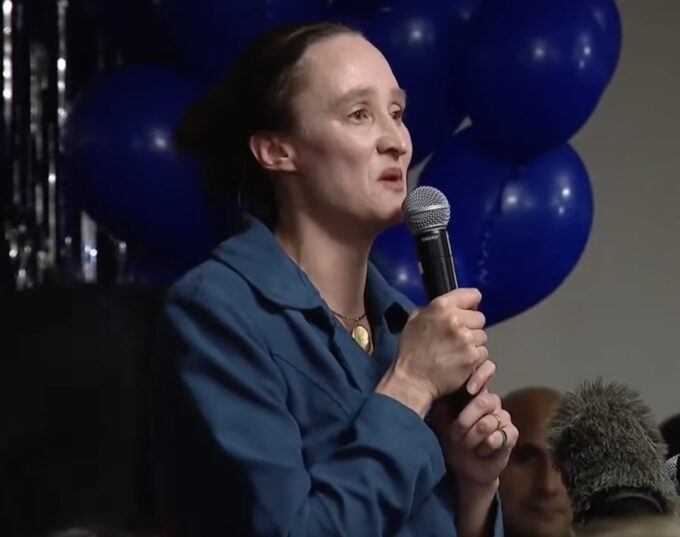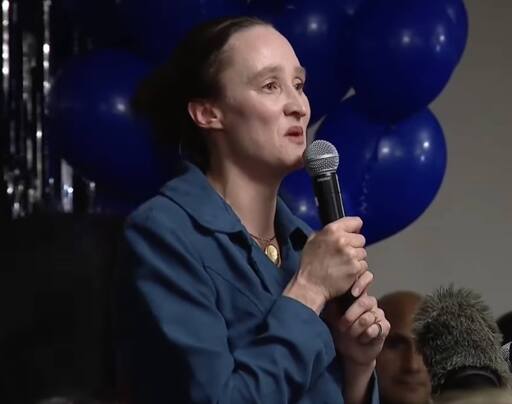
Katie Wilson, mayor-elect of Seattle. Screenshot of a video posted to Youtube.
“It was the best of times” – two democratic socialists elected mayors of New York and Seattle – “it was the worst of times” – Donald Trump is still president and opposition has failed to materialize nationally. Yet the elections of Zohran Mamdani in New York and Katie Wilson in Seattle suggest that something positive may be emerging. Is progressive politics starting to take hold and the Democratic Party’s old guard fading? Or are the two elections simply bicoastal phenomena limited to the local rather than the national?
Every day I receive emails like this: “Good morning, fellow Democrats. Please don’t click away from this brief message. We’d like to share a few updates with you: We’re getting closer and closer to the midterms — our chance to take back Congress and check Trump’s power. With that in mind, we’re asking you to contribute $7 to the DNC today to help us elect Democrats up and down the ballot.”
All the messages do is to ask for money and lambast Trump. Where are the ideas? Where is a vision that reflects the Mamdani and Wilson victories?
Fintan O’Toole proposes a new vision in his passionate review of Kamala Harris’ 107 Days in The New York Review of Books. He begins with the obvious, “the Democrats do not need reruns of the disaster movie but a sharp and urgent understanding of why they failed and how they can fight back.” The above DNC request is an obvious example of the lack of a “sharp and urgent understanding of why they failed and how they can fight back.”
The Irish journalist, literary editor and drama critic focuses on what Democrats can do positively by reminding us of the modern Democratic Party’s roots: “It was a Democrat, Eleanor Roosevelt, who did most to shape the Universal Declaration of Human Rights,” he points out. “That universalism was meant not just to anchor America in a compact with the rest of the world but to be a touchstone for its own domestic progress toward an ever fuller democracy.” Why is this important today? “The Democrats need to return to it as the foundation both for a challenge to Trump’s foreign policy and for a transcendence of narrow identity politics at home.”
Human rights, for O’Toole, are not just vague bromides to be “mainstreamed” in superficial United Nations diplomatic declarations. They are to be the very “foundation” of U.S. foreign and domestic policies. Think of what prioritizing human rights would have meant for the golden carpet welcome MBS received in Washington. Think about what putting human rights at the center of U.S. foreign policy would mean for Trump’s relationships with his buddies Vlad and Bibi. Domestically, think of what highlighting human rights would mean for the binary policies Trump has initiated as well as ICE attacks on migrants.
And what about Mamdani and Wilson? Here O’Toole imagines what the future might look like: “If radicalism is that label that will be affixed to all resistance to Trump why not embrace radicalism?” Specifically, he writes; “There is now a vague understanding among established Democrats that the old concept of the party has become, if not redundant, then certainly inadequate.”
Mamdani’s victory is directly relevant for O’Toole. In calling for renewal from the outside, O’Toole notes; “Zohran Mamdani’s campaign for the New York mayoralty provides the most obvious example of what this [renewal from the outside] looks like.”
Where to find “renewal from the outside” beyond New York and Seattle? How to expand the Democrat’s tent to make it even bigger and more inclusive? The place to find renewal, for O’Toole, is to re-examine the politics of class. “Democrats must go back to the basics of class politics,” he implores.
O’Toole’s call for a return “to the basics of class politics” was echoed by James Carville in the New York Times. The Ragin’ Cajun rejects his previous Clinton positions as well as his previous calls for Democrats to play dead while Republicans implode: “I am now an 81-year-old man and I know that in the minds of many, I carry the torch from a so-called centrist political era,” he begins. “Yet it is abundantly clear even to me that the Democratic Party must now run on the most populist economic platform since the Great Depression. It is time for Democrats to embrace a sweeping, aggressive, unvarnished, unapologetic and altogether unmistakable platform of pure economic rage. This is our only way out of the abyss.”
O’Toole and Carville are urging Democrats to move to the economic left, away from Clinton neo-liberalism, away from Obama’s upscale Martha Vineyard’s crowd, and away from the tech billionaires who have returned, predictably, to their traditional Republican safe haven. Economic, social and cultural rights are fundamental for getting “out of the abyss.”
And what if Democrats don’t “go back to the basics of class politics”? What if they don’t prioritize human rights? What if there is no “pure economic rage”? O’Toole has a clear message to Democrats: “If the Democrats do not seem brave enough to take the risks involved in speaking against the overweening oligarchy, they will not prevent Trumpism from establishing itself as the American political order for the foreseeable future.”
Risks got Mamdani and Wilson elected. The next step for them is to govern cities as diverse and complex as New York and Seattle. If democratic socialism is to be more than a bicoastal movement and moment, Mamdani and Wilson must show success in governing.
And in order to do so, they should reference Milwaukee – far from a bicoastal city – where socialist mayors governed for more than fifty years starting in 1910. “The rise and effectiveness of the town’s socialist governments largely depended on a radical political organization rooted in Milwaukee’s trade unions and working class,” Eric Blanc wrote in Labor Politics.
Can democratic socialism have a national impact? Or is this merely a tale of two elections in bicoastal cities at a particular moment in time? A Tale of Two Cities was written in the years leading up to and during the French Revolution. Today, under Trump 2.0, an anti-democratic revolution is taking place in the United States. The elections in New York and Seattle could be the beginning of a larger, national, democratic counter-revolution. Now that would be more than just a simple tale of two cities.
The post A Tale of Two Cities: New York and Seattle appeared first on CounterPunch.org.
From CounterPunch.org via this RSS feed


